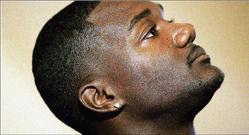
Justin Gatlin ... I know in my heart I haven't done anything wrong. - File
LOS ANGELES (AP):
SPRINTER JUSTIN Gatlin got his doping ban reduced, but not by enough to make him eligible to defend his Olympic 100-metre title this year. An arbitration panel, in a ruling released on Tuesday, reduced the 25-year-old sprinter's potential eight-year ban to four. With the ban set to expire May 24, 2010, it means Gatlin would be on the sidelines for the Beijing Olympics in August.
But the panel left open the possibility of a further reduction.
The panel ruled Gatlin committed a doping offence when he tested positive for excessive testosterone in April 2006, but the sprinter's first doping offence in 2001 troubled the group.
If that doping violation were erased, that would make Gatlin's 2006 case his first offence, clearing the way for a further reduced ban. First doping offences often result in a two-year ban, which would make him eligible to run in May, one month before the U.S. Olympic trials.
"I'm a fighter and I've been a fighter from the very beginning and I'm going to continue to fight," Gatlin told The Washington Post on Tuesday. "I know in my heart I haven't done anything wrong. I have been robbed. I have been cheated of an opportunity to finish my career."
The real dilemma
Gatlin has six months to appeal.
The panel called the circum-stances surrounding Gatlin's first offence "the real dilemma".
As a 19-year-old competitor at the World Junior Championships, Gatlin tested positive for ampheta-mines, part of a prescribed medi-cation he was taking for attention deficit disorder. Gatlin stopped taking the medicine a few days before the competition, but it didn't clear his system, according to the case records. He received a two-year ban.
The International Association of Athletics Federations (IAAF), the sport's world governing body, later reinstated Gatlin after he had served only one year of the ban but never specifically said Gatlin had 'no fault' in the case.
The United States Anti-Doping Agency (USADA) characterised Gatlin's reinstatement as a reduction in the ban whereas Gatlin contended it vacated the finding of a doping offense.
The panel said Gatlin could go through an appeals process to seek a finding of no fault in the first case or ask the IAAF for a clarification on its earlier ruling.
No significant fault
"The actions of the IAAF clearly suggest at a minimum, a finding of 'no significant fault' in 2001," the panel said. "However, there is no evidence from which this panel may determine that a finding of 'no fault' under the current WADA (World Anti-Doping Agency) standard was made or could be inferred."
'No significant fault' would leave Gatlin still somewhat responsible for the positive test, and it would remain a first offence. A 'no fault' finding would erase the offence.
The 2001 findings came under different standards than those in effect now because the World Anti-Doping Code had yet to be established.
A family member who said he was speaking on Gatlin's behalf told The Associated Press "the fight is not over for us.
"We feel we were wrongly done," said the man who answered the phone at Gatlin's parents' home but declined to give his name. "He has a disability. The family is going to sit down. We're going to decide where to go next."
Gatlin's attorney John Collins did not return messages.
The ruling means Gatlin must wait to regain his world record in the 100m. He shared the record of 9.77 seconds with Jamaica's Asafa Powell. Since then, Powell has improved the record, finishing in 9.74 seconds last September. Gatlin, who held himself up as a role model for clean competition before his positive test, has said he doesn't know how steroids got into his system before the April 2006 test.
Denied allegations
Gatlin accused a disgruntled massage therapist of rubbing a steroid cream on him to trigger the positive test, but the massage therapist repeatedly denied the allegations.
The panel rejected that defence and noted Gatlin also acknowledged receiving an injection of what was purported to be vitamin B-12 from an assistant coach before the Kansas meet.
"We have no higher priority than the commitment we have made to clean competition," U.S. Olympic Committee spokesman Darryl Seibel said. "If that means leaving behind when we go to the Games an athlete who has the talent and ability to break world records, but has also cheated, so be it. That's an easy choice to make."
The panel noted Gatlin's co-operation with a federal doping investigation.
"While Mr. Gatlin seems like a complete gentleman, and was genuinely and deeply upset during his testimony, the panel cannot eliminate the possibility that Mr. Gatlin intentionally took testosterone, or that he accepted it from a coach, even though he testified to the contrary," the ruling said.
USADA general counsel Bill Bock said Gatlin helped federal authorities "in investigating doping in sport, to the extent of wearing wire in communications with his former coach," Trevor Graham. Bock also said Jeff Novitzky, the lead investigator in the Bay Area Laboratory Co-Operative steroid investigation, testified about Gatlin's assistance.
"Mr. Gatlin should be commended for his decision to cooperate with authorities following his positive test," USADA chief executive officer Travis Tygart said in a statement.
"However, these efforts do not completely remove his responsibility for his second doping offence. Given his cooperation and the cir-cumstances relating to Mr. Gatlin's first offence, the four-year penalty issued by the arbitration panel is a fair and just outcome."

